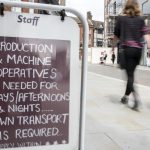In a new blog for the Conversation, Professor Meena Kumari and Research Associate Amanda Hughes investigate how socioeconomic disadvantage and other environmental factors can affect our biology and life expectancy.
Blog
ISER researchers discuss their work in these blog posts.

Basic Income – testing of a fascinating policy
- Iva Valentinova Tasseva
Iva Tasseva looks at why ISER’s tax-benefit microsimulation model EUROMOD is essential for analysing the morning-after effects of tax and benefit reforms, and how new studies using the model have tested out the controversial and increasingly politically fascinating idea of a Basic Income.

Lower child mortality: a boost to women’s labour market opportunities
- Atheendar Venkataramani
- Selma Walther
- Sonia Bhalotra
In a blog for Global Dev, MiSoC’s Professor Sonia Bhalotra together with Atheendar Venkataramani (Perelman School of Medicine) and Selma Walther (applied microeconomist) investigate whether public investments in reducing child mortality may encourage women into greater economic activity.

Innovations in surveys: the pioneers of targeted design
Professor Peter Lynn describes how ISER has pioneered a new approach to sample retention which promises to improve the value for money of longitudinal surveys.

The distribution of the gender wage gap
- Manuel Fernandez Sierra
Using a quarter of a century’s data from Mexico, ISER’s Professor Sonia Bhalotra and Manuel Fernandez Sierra analyse the impacts of the rising number of women in the labour force on the gender wage gap.

With more people gaining a university degree, how is society as a whole being affected? MiSoC workshop 13-14 June
Angus Holford introduces MiSoC’s workshop on the Economics of Higher Education 13-14 June with keynote speakers Peter Arcidiacono (Duke University) and Todd Stinebrickner (Western Ontario)

The long-run effects of attending an elite school
Professor Emilia Del Bono writes about her work exploring the impact of elite school attendance on long-run outcomes including completed education, income, and fertility.

Skilled migrants have higher earning potential in countries with more inequality
- Matthias Parey
In their blog for the LSE Business Review, MiSoC’s Matthias Parey, with colleagues Jens Ruhose (IZA), Fabian Waldinger (LSE) and Nicolai Netz (DZHW) investigate the migration patterns of high-skilled workers and find that they respond to economic incentives.

Early gender gaps among university graduates
- Matthias Parey
- Marco Francesconi
In a recent blog for the Centre for Economic Policy Research’s VoxEU, MiSoC’s Matthias Parey and MiSoC Research Associate Marco Francesconi investigate the gender pay gap by exploring the recent experience of university graduates in Germany soon after their graduation.

Ethnicity and Integration?
In an article for Discover Society, Alita Nandi responds to the government’s Integrated Communities Strategy Paper 2018

Religion and abortion: The role of politician identity
In a column for [Ideas for India](http://www.ideasforindia.in/topics/social-identity/religion-and-abortion-the-role-of-politician-identity.html), Professor Sonia Bhalotra and her colleagues Irma Clots-Figueras of Universidad Carlos III de Madrid and Lakshmi Iyer of the University of Notre Dame introduce their new research paper which examines whether the religious identity of legislators influences abortion rates in the districts in which they are elected, conditional upon their party affiliation

How India’s bridal dowry tradition leads to missing women
In a new discussion paper for the Centre for Economic Policy Research, Professor Sonia Bhalotra and her colleagues Abhishek Chakravarty of the University of Manchester and Selim Gulesci of Bocconi University investigate how the financial burden of dowry expectation contributes to the sex ratio imbalance in India

